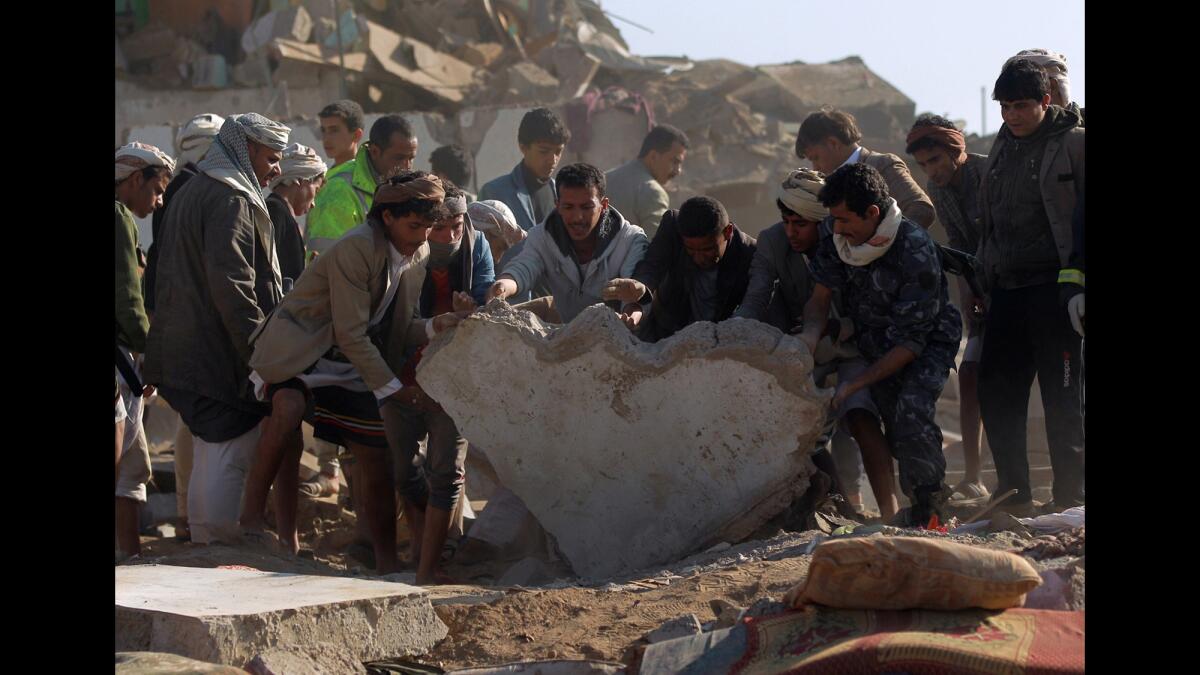Column: U.S.-made weapons sold to the Saudis are fueling civilian deaths in Yemen

- Share via
In December 2016, President Obama restricted the sale of American arms to Saudi Arabia, citing concerns about the widespread killings of civilians in the brutal war in Yemen.
He should have done it much earlier, and the restrictions didn’t go far enough, but it was a step forward. Or it seemed to be until Donald Trump took office just a month later and reversed course, starting the sales up again.
Since then, a wedding party and even a school bus have been bombed with U.S.-made weapons supplied to the Saudi coalition forces.
Disturbed by the continuing civilian deaths, Congress has tried to end U.S. support for the war in Yemen, where the Saudis and their allies are trying to drive Iranian-backed Houthi insurgents out of power. But Trump vetoed its bipartisan resolution. And when lawmakers put a hold on an $8.1-billion arms sale to the Saudi coalition last year, it was undone by Secretary of State Michael R. Pompeo’s declaration of an “emergency” that he attributed to Iran’s “malign” activities in the region.
So the sales have continued.
Now even the State Department has acknowledged that our arming of the Saudi coalition is problematic — or at least the agency’s independent inspector general has. In a report out this month, the inspector general concluded that the U.S. government failed to “fully assess risks and implement mitigation measures to reduce civilian casualties” from American-made precision-guided bombs in Yemen.
The calamitous war in Yemen has created the worst humanitarian crisis in the world. Millions of Yemenis are facing cholera, famine, displacement and economic collapse.
And our country’s fingerprints are all over the mess, raising serious questions about our advocacy of global human rights and our commitment to the rules of war.
“Look, we should not be involved in war crimes or human rights abuses, period,” Rep. Tom Malinowski (D-N.J.) says. “If we know they’re being committed with our weapons, and if the country we’re selling to is refusing our advice to change its behavior, from that point on we are complicit. And the Saudis have consistently refused our advice even as they have taken our weapons.”
How does it happen that U.S.-made weapons are routinely being used to kill civilians on the other side of the world? Simple. American arms manufacturers make and sell the military equipment — including planes, helicopters, bombs, missiles and spare parts of all sorts. The U.S. government approves the sales. The Saudis and their allies fly the planes, pull the triggers and detonate the bombs.
In April 2018, Saudi-led coalition forces dropped an American-made GBU-12 bomb on a wedding celebration in Al-Rafa village in Yemen, killing 21 people, including 11 children. In September 2016, 23 people were killed in the bombing of a residential neighborhood in western Yemen near the Red Sea, a remnant of a U.S.-made GBU-16 laser-guided bomb was found at the site. And in August 2018, a laser-guided MK 82 bomb manufactured in the United States destroyed a school bus in Northern Yemen, killing 40 children.
Those are just a few examples from a long list.
Today, the United States is the world’s biggest arms seller, and Saudi Arabia is its biggest client. American companies selling to Saudi Arabia include General Dynamics, Raytheon and Boeing.
It has long been the U.S. position that arms sales can work to our advantage. By arming our allies, we can help them meet their “sovereign self-defense needs,” as the State Department puts it. In theory, it protects them, keeps us from being drawn into their conflicts and creates jobs and profits here at home.
But how can we as a country possibly deny all moral responsibility when the deadly weapons we sell are misused — especially if that misuse is persistent and predictable? Surely it’s possible to bar weapons sales to repeat offenders. Surely when survivors are posting cellphone photos of bomb shards that say “Made in the U.S.A.,” something needs to change.
A U.N. report last September went so far as to suggest that the role of the U.S. in arming and backing the Saudi coalition might make it legally complicit.
Human Rights Watch, which does not routinely call for bans on arms sales, has called for one in this case.
“We see the attacks by the Saudi-led coalition as so egregious and so non-responsive to international or domestic pressure that we have come to believe the countries actively selling them weapons are participants,” says Andrea Prasow, acting Washington director of Human Rights Watch.
Trump insists that he shares concerns about civilian casualties and says the U.S. is training coalition forces to improve their targeting.
And indeed, American advisors have worked with the Saudis at their operations headquarters in Riyadh — assessing collateral damage risks, making sure proposed targets aren’t on the no-strike list, and ensuring the underlying intelligence is accurate.
But the work has been ineffective, in part because casualties rarely occur in such pre-planned, “deliberate” strikes. They occur in “dynamic strikes,” where a coalition airplane flies over Yemen, gets in touch with an ally on the ground and asks for real-time targeting advice.
The truth is that the Saudis have shown little willingness to change their behavior — not because they don’t know how or lack training or advice, but because they lack the political will to do so. The United States, for its part, lacks the will to disentangle itself from this humanitarian catastrophe.
@Nick_Goldberg
More to Read
A cure for the common opinion
Get thought-provoking perspectives with our weekly newsletter.
You may occasionally receive promotional content from the Los Angeles Times.











